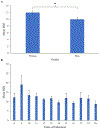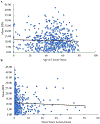Depression symptoms in neurological patients: A survey of a large cohort of patients with focal brain lesions
- PMID: 36148958
- PMCID: PMC9588777
- DOI: 10.1080/13803395.2022.2123896
Depression symptoms in neurological patients: A survey of a large cohort of patients with focal brain lesions
Abstract
Introduction: Examining depression following neurological injury is useful for understanding post-lesion depression and depression more generally. The extant literature shows variability in the incidence and severity of depression post-lesion, likely due to heterogeneity in study methodology, patient samples, measures of depression, and time of assessment. Here, we aim to characterize depression symptoms and their demographic correlates in a large sample of individuals in the chronic epoch following a focal brain lesion.
Method: We sampled 492 individuals who had focal, stable brain lesions and were in the chronic epoch (≥3 months post-onset). Demographic (gender, years of education), temporal (age at lesion onset, time since lesion onset), and lesion (lesion laterality, lesion etiology, lesion volume) factors were used to predict depression symptoms measured by the Beck Depression Inventory (BDI).
Results: We found that on average, neurological patients exhibited elevated levels of depression symptoms (although not clinically significant) relative to a community sample, and the neurological patients showed higher rates of mild and moderate depression symptoms than are typical in a community sample. Gender and lesion etiology were predictive of depression symptoms, whereby women and patients with ischemic stroke had higher levels of depression symptoms.
Conclusions: Our results suggest that depression symptom severity may be elevated following a focal brain lesion. Moreover, some individuals may be more likely to develop depression symptoms post-lesion than others. This may be mediated by individual factors such as gender and lesion etiology. The findings have important implications for the diagnosis, prognosis, and treatment of depression in neurological patients.
Keywords: BDI; Depression; lesion; neurological outcomes; poststroke depression.
Conflict of interest statement
Disclosures of interest
The authors report no conflicts of interest.
Figures





Similar articles
-
Is poststroke depression a major depression?Cerebrovasc Dis. 2013;35(4):385-91. doi: 10.1159/000348852. Epub 2013 Apr 30. Cerebrovasc Dis. 2013. PMID: 23635428
-
Letter to the Editor: Depression As The First Symptom Of Frontal Lobe Grade 2 Malignant Glioma.Turk Psikiyatri Derg. 2022 Summer;33(2):143-145. doi: 10.5080/u25957. Turk Psikiyatri Derg. 2022. PMID: 35730515 English, Turkish.
-
Serum levels of cytokines, glucose, and hemoglobin as possible predictors of poststroke depression, and association with poststroke fatigue.Int J Neurosci. 2012 Nov;122(11):682-90. doi: 10.3109/00207454.2012.709892. Epub 2012 Aug 14. Int J Neurosci. 2012. PMID: 22812657
-
Somatic symptom overlap in Beck Depression Inventory-II scores following myocardial infarction.Br J Psychiatry. 2010 Jul;197(1):61-6. doi: 10.1192/bjp.bp.109.076596. Br J Psychiatry. 2010. PMID: 20592436 Free PMC article.
-
Assessment of depression after stroke: a comparison of different screening instruments.Stroke. 2009 Feb;40(2):523-9. doi: 10.1161/STROKEAHA.108.527705. Epub 2008 Dec 12. Stroke. 2009. PMID: 19074478 Review.
References
-
- American Psychiatric Association. (2013). Diagnostic and Statistical Manual of Mental Disorders (5th ed.).
-
- Angeleri F, Angeleri VA, Foschi N, Giaquinto S, Nolfe G, Saginario A, & Signorino M (1997). Depression after stroke: An investigation through catamnesis. Journal of Clinical Psychiatry, 58(6), 261–265. - PubMed
-
- Bar M, Skoloudik D, & Roubec M (2009). Post-stroke depression: A one year prospective follow-up study. Journal of the Neurological Sciences, 285, S172. 10.1016/s0022-510x(09)70658-6 - DOI
Publication types
MeSH terms
Grants and funding
LinkOut - more resources
Full Text Sources
Medical
